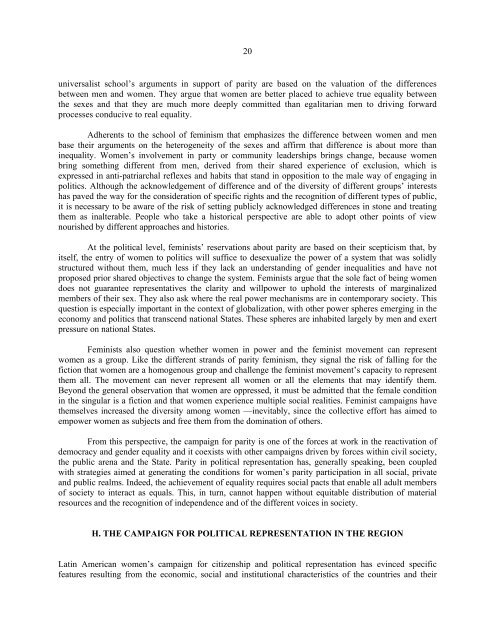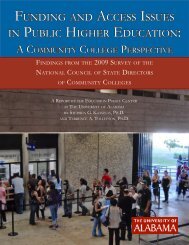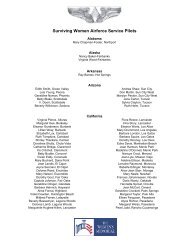Women in Latin America and the Caribbean - Cepal
Women in Latin America and the Caribbean - Cepal
Women in Latin America and the Caribbean - Cepal
Create successful ePaper yourself
Turn your PDF publications into a flip-book with our unique Google optimized e-Paper software.
20<br />
universalist school’s arguments <strong>in</strong> support of parity are based on <strong>the</strong> valuation of <strong>the</strong> differences<br />
between men <strong>and</strong> women. They argue that women are better placed to achieve true equality between<br />
<strong>the</strong> sexes <strong>and</strong> that <strong>the</strong>y are much more deeply committed than egalitarian men to driv<strong>in</strong>g forward<br />
processes conducive to real equality.<br />
Adherents to <strong>the</strong> school of fem<strong>in</strong>ism that emphasizes <strong>the</strong> difference between women <strong>and</strong> men<br />
base <strong>the</strong>ir arguments on <strong>the</strong> heterogeneity of <strong>the</strong> sexes <strong>and</strong> affirm that difference is about more than<br />
<strong>in</strong>equality. <strong>Women</strong>’s <strong>in</strong>volvement <strong>in</strong> party or community leaderships br<strong>in</strong>gs change, because women<br />
br<strong>in</strong>g someth<strong>in</strong>g different from men, derived from <strong>the</strong>ir shared experience of exclusion, which is<br />
expressed <strong>in</strong> anti-patriarchal reflexes <strong>and</strong> habits that st<strong>and</strong> <strong>in</strong> opposition to <strong>the</strong> male way of engag<strong>in</strong>g <strong>in</strong><br />
politics. Although <strong>the</strong> acknowledgement of difference <strong>and</strong> of <strong>the</strong> diversity of different groups’ <strong>in</strong>terests<br />
has paved <strong>the</strong> way for <strong>the</strong> consideration of specific rights <strong>and</strong> <strong>the</strong> recognition of different types of public,<br />
it is necessary to be aware of <strong>the</strong> risk of sett<strong>in</strong>g publicly acknowledged differences <strong>in</strong> stone <strong>and</strong> treat<strong>in</strong>g<br />
<strong>the</strong>m as <strong>in</strong>alterable. People who take a historical perspective are able to adopt o<strong>the</strong>r po<strong>in</strong>ts of view<br />
nourished by different approaches <strong>and</strong> histories.<br />
At <strong>the</strong> political level, fem<strong>in</strong>ists’ reservations about parity are based on <strong>the</strong>ir scepticism that, by<br />
itself, <strong>the</strong> entry of women to politics will suffice to desexualize <strong>the</strong> power of a system that was solidly<br />
structured without <strong>the</strong>m, much less if <strong>the</strong>y lack an underst<strong>and</strong><strong>in</strong>g of gender <strong>in</strong>equalities <strong>and</strong> have not<br />
proposed prior shared objectives to change <strong>the</strong> system. Fem<strong>in</strong>ists argue that <strong>the</strong> sole fact of be<strong>in</strong>g women<br />
does not guarantee representatives <strong>the</strong> clarity <strong>and</strong> willpower to uphold <strong>the</strong> <strong>in</strong>terests of marg<strong>in</strong>alized<br />
members of <strong>the</strong>ir sex. They also ask where <strong>the</strong> real power mechanisms are <strong>in</strong> contemporary society. This<br />
question is especially important <strong>in</strong> <strong>the</strong> context of globalization, with o<strong>the</strong>r power spheres emerg<strong>in</strong>g <strong>in</strong> <strong>the</strong><br />
economy <strong>and</strong> politics that transcend national States. These spheres are <strong>in</strong>habited largely by men <strong>and</strong> exert<br />
pressure on national States.<br />
Fem<strong>in</strong>ists also question whe<strong>the</strong>r women <strong>in</strong> power <strong>and</strong> <strong>the</strong> fem<strong>in</strong>ist movement can represent<br />
women as a group. Like <strong>the</strong> different str<strong>and</strong>s of parity fem<strong>in</strong>ism, <strong>the</strong>y signal <strong>the</strong> risk of fall<strong>in</strong>g for <strong>the</strong><br />
fiction that women are a homogenous group <strong>and</strong> challenge <strong>the</strong> fem<strong>in</strong>ist movement’s capacity to represent<br />
<strong>the</strong>m all. The movement can never represent all women or all <strong>the</strong> elements that may identify <strong>the</strong>m.<br />
Beyond <strong>the</strong> general observation that women are oppressed, it must be admitted that <strong>the</strong> female condition<br />
<strong>in</strong> <strong>the</strong> s<strong>in</strong>gular is a fiction <strong>and</strong> that women experience multiple social realities. Fem<strong>in</strong>ist campaigns have<br />
<strong>the</strong>mselves <strong>in</strong>creased <strong>the</strong> diversity among women —<strong>in</strong>evitably, s<strong>in</strong>ce <strong>the</strong> collective effort has aimed to<br />
empower women as subjects <strong>and</strong> free <strong>the</strong>m from <strong>the</strong> dom<strong>in</strong>ation of o<strong>the</strong>rs.<br />
From this perspective, <strong>the</strong> campaign for parity is one of <strong>the</strong> forces at work <strong>in</strong> <strong>the</strong> reactivation of<br />
democracy <strong>and</strong> gender equality <strong>and</strong> it coexists with o<strong>the</strong>r campaigns driven by forces with<strong>in</strong> civil society,<br />
<strong>the</strong> public arena <strong>and</strong> <strong>the</strong> State. Parity <strong>in</strong> political representation has, generally speak<strong>in</strong>g, been coupled<br />
with strategies aimed at generat<strong>in</strong>g <strong>the</strong> conditions for women’s parity participation <strong>in</strong> all social, private<br />
<strong>and</strong> public realms. Indeed, <strong>the</strong> achievement of equality requires social pacts that enable all adult members<br />
of society to <strong>in</strong>teract as equals. This, <strong>in</strong> turn, cannot happen without equitable distribution of material<br />
resources <strong>and</strong> <strong>the</strong> recognition of <strong>in</strong>dependence <strong>and</strong> of <strong>the</strong> different voices <strong>in</strong> society.<br />
H. THE CAMPAIGN FOR POLITICAL REPRESENTATION IN THE REGION<br />
Lat<strong>in</strong> <strong>America</strong>n women’s campaign for citizenship <strong>and</strong> political representation has ev<strong>in</strong>ced specific<br />
features result<strong>in</strong>g from <strong>the</strong> economic, social <strong>and</strong> <strong>in</strong>stitutional characteristics of <strong>the</strong> countries <strong>and</strong> <strong>the</strong>ir











